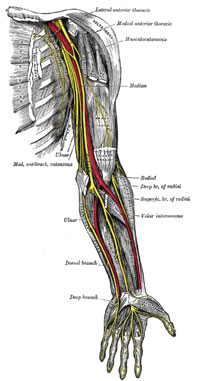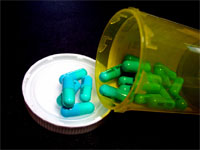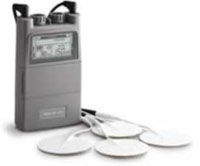Getting on Your Nerves: Neuropathy and Dialysis
You may feel burning, tingling, pins and needles, prickles in your hands or feet - or parts of them may be numb. What is neuropathy, and what can you do about it? Read on and we'll give you the scoop on dialysis nerve damage and how to prevent and treat it.
Nerves and neuropathy

Your nerves are like phone cables; they take signals to and from your body's surface to your spinal cord (your central switchboard). In the figure, right, from the Grey's Anatomy book, you can see the nerves in yellow.
When someone strokes your hand, that signal is carried by a nerve to your spinal cord. If, instead, someone pokes your hand with a tack, you feel this in a different way - and your nerves allow you to tell which is which.
Neuropathy is nerve damage. On dialysis, this most often affects peripheral nerves - in the hands and feet. Nerves can be harmed by:
- Squeezing them through a too-tight space
- e.g., in carpal tunnel syndrome, nerves to the hand are compressed at the wrist
- Immune disease
- that attacks the nerves
- Poor blood flow
- this is more likely in the legs and feet
- Infection
- such as shingles
- Diabetes
- half of people with diabetes have some degree of nerve damage
- Poisons
- like lead or mercury
Besides burning, numbness, and tingling, neuropathy can cause:
- Muscle wasting in the hands and feet
- Erectile dysfunction
- Muscle weakness
Nerve damage can change sensation, so soft fur might feel prickly to you. Or, you may have nerve damage without any symptoms. It can take years to feel the damage.
Dialysis and nerves

Neuropathy in people on dialysis is quite common - from 60 to 100% may have it. 1 Why? In one study, a greater number of active nerves was found right after an HD treatment. It is believed that toxins that build up in the blood may poison the nerves. 2
We don't yet know which toxins are the culprits. Studies have found that high levels of potassium reduce the nerves' ability to act; this may cause part of the problem. 3,4 A middle molecule called TNF alpha has also been found in higher levels in people on peritoneal dialysis (PD) who have neuropathy than in those who don't. 5 So this may also be a clue.
Preventing neuropathy
Clearly, the best defense is a good offense. You are best off if you can avoid neuropathy. Research has found that neuropathy mainly happens when the GFR (the amount of filtering) is less than 12 ml/min. 1 This finding was much like that of a German study of 84 people on HD. Neuropathy was found to be more likely the longer someone was on standard HD - and the lower the dose of treatment. Men were more likely to have problems than women. 6
These findings mean that you may be able to prevent nerve damage by getting your blood cleaner with:
- Two dialyzers in sequence
- Daily HD
- Nocturnal HD
If you have diabetes, keeping your blood sugar in the target range can also help you prevent nerve damage. Ask your doctor to refer you to a nurse educator and/or dietitian if you need help to manage your disease.
Treating neuropathy
Once nerve damage occurs, you may need to try a number of things to get relief from the pain and numbness. Some options include:
- Get more dialysis
- Even if you have nerve damage symptoms, getting your blood cleaner may help keep them from getting worse. And, it may even help them to get a bit better.
- Relieve pressure
- If you have carpal tunnel syndrome, a nerve problem, you may need surgery to free up space in your wrists for your nerves to fit.
- Treat vitamin deficiencies
- Dialysis removes vitamin B6. 7 Taking B6 supplements helped relieve nerve pain in people on PD 8 and on HD. 9 If you don't take a renal vitamin, ask your nephrologist to suggest one.
- Treat mineral deficiencies
- Dialysis also removes zinc. In one random, double-blind, crossover study, adding zinc to the dialysis bath helped nerve function - and sense of taste. 10 Before you take any kind of supplement, talk with your nephrologist and your dietitian.
Pain control for neuropathy

A number of kinds of drugs have been used to treat nerve pain. As with any drug, these can have side effects; it can take time to find one that best helps you. Here are some drugs the Mayo Clinic suggests: 11
- Over-the-counter pain pills
- If your symptoms are mild, acetaminophen (e.g., Tylenol®) or an NSAID (e.g., Motrin®, Aleve®, Advil®) may help. NSAIDs (nonsteroidal anti-inflammatory drugs) can reduce your remaining kidney function.
- Capsaicin cream
- Products based on the ingredient that gives chili peppers their heat can help nerve pain. You rub them on the skin (and keep the cream away from your eyes).
- Antidepressants
- Low doses of some tricyclic or SSRI antidepressants can help pain (and sleep problems) along with depression.
- Lidocaine patch
- If your pain is mostly in one place, a skin patch with a topical anesthetic may help. You may need to use a new patch up to three times per day.
- Anti-seizure drugs
- Some drugs in this class, such as Neurontin® (gabapentin), Tegretol® (carbamazepine), Dilantin® (phenytoin), and Lyrica® (pregabalin) may help relieve some nerve pain. These drugs are very strong and have many side effects.
- Other drugs
- A heart rhythm drug called Mexitil® (mexiletine HCl) may help burning pain. This drug can worsen heart failure.
- Prescription pain pills
- Opiate drugs like codeine, morphine, or oxycontin may relieve pain, but can cause addiction.
Non-drug options for nerve pain

If you have tried drugs - or you don't want to - the Mayo Clinic also suggests some other options: 11
- Acupuncture
- Very thin needles are used to stimulate vital energy in the body. You may need a few treatments, and they can be costly.
- Hypnosis
- While you are in a light trance, you are given suggestions to help you feel less pain.
- Relaxation
- Tensing your muscles can make your pain worse. A gentle form of Yoga, Tai Chi, meditation, or guided imagery may help you learn to relax.
- TENS
- A small machine sends electrical pulses to help block the path of nerve pain through your skin. It is safe and painless and may help. (See figure at right for one type of TENS unit.)
Conclusion
Neuropathy is common in dialysis, but you can take steps to prevent it or to treat it once it happens. If you are not doing longer or more frequent HD, you may want to think about trying one of these treatments.
If you have neuropathy, it may take some time to find your way to a treatment that helps you, but there are a number of options you can try. Talk with your doctor to be sure you are doing all you can to keep your nerves healthy.
References:
- Krishnan AV, Kiernan MC. Uremic neuropathy: clinical features and new pathophysiological insights. Muscle Nerve. 2007 Mar;35(3):273-90.
- Mansouri B, Adybeig B, Rayegani M, Yasami S, Behshad V. Uremic neuropathy and the analysis of electrophysiological changes. Electromyogr Clin Neurophysiol. 2001 Mar;41(2):107-15.
- Krishnan AV, Phoon RK, Pussell BA, Charlesworth JA, Bostock H, Kiernan MC. Altered motor nerve excitability in end-stage kidney disease. Brain. 2005 Sep;128(Pt 9):2164-74.
- Krishnan AV, Phoon RK, Pussell BA, Charlesworth JA, Kiernan MC. Sensory nerve excitability and neuropathy in end stage kidney disease. J Neurol Neurosurg Psychiatry. 2006 Apr;77(4):548-51.
- Espinoza M, Aguilera A, Auxiliadora Bajo M, Codoceo R, Caravaca E, Cirugeda A, del Peso G, Hevia C, Selgas R. Tumor necrosis factor alpha as a uremic toxin: correlation with neuropathy, left ventricular hypertrophy, anemia, and hypertriglyceridemia in peritoneal dialysis patients. Adv Perit Dial. 1999;15:82-6.
- Hojs-Fabjan T, Hojs R. Polyneuropathy in hemodialysis patients: the most sensitive electrophysiological parameters and dialysis adequacy. Wien Klin Wochenschr. 2006;118 Suppl 2:29-34.
- Clayton PT. B6-responsive disorders: a model of vitamin dependency. J Inherit Metab Dis. 2006 Apr-Jun;29(2-3):317-26.
- Moriwaki K, Kanno Y, Nakamoto H, Okada H, Suzuki H. Vitamin B6 deficiency in elderly patients on chronic peritoneal dialysis. Adv Perit Dial. 2000;16:308-12.
- Okada H, Moriwaki K, Kanno Y, Sugahara S, Nakamoto H, Yoshizawa M, Suzuki H. Vitamin B6 supplementation can improve peripheral polyneuropathy in patients with chronic renal failure on high-flux haemodialysis and human recombinant erythropoietin. Nephrol Dial Transplant. 2000 Sep;15(9):1410-3.
- Sprenger KB, Bundschu D, Lewis K, Spohn B, Schmitz J, Franz HE. Improvement of uremic neuropathy and hypogeusia by dialysate zinc supplementation: a double-blind study. Kidney Int. 1983;Dec 16: Suppl 315-8.
- Peripheral neuropathy: Treatment. Accessed June 27, 2007.

